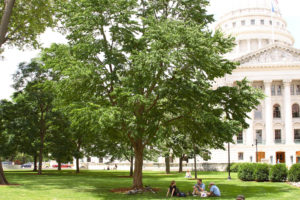May is National Asthma and Allergy Awareness Month. Did you know trees help prevent asthma and other respiratory diseases? Trees filter particles out of the air we breathe, which decreases our risk of respiratory illnesses, including asthma. One study found that in 2010, trees removed 17.4 million tons of air pollution across the US, which prevented 850 human deaths and 670,000 cases of acute respiratory symptoms.
 Trees have the greatest impact on ozone and particulate matter. Breathing ground-level ozone has a number of detrimental health effects, including inflammation of the airways and a decrease in lung function. Specifically, high daily ozone concentrations are associated with increased asthma attacks and hospital admissions. One study found that street trees are associated with a lower prevalence of early childhood asthma. Trees may be a natural, low-cost part of the solution.
Trees have the greatest impact on ozone and particulate matter. Breathing ground-level ozone has a number of detrimental health effects, including inflammation of the airways and a decrease in lung function. Specifically, high daily ozone concentrations are associated with increased asthma attacks and hospital admissions. One study found that street trees are associated with a lower prevalence of early childhood asthma. Trees may be a natural, low-cost part of the solution.
A common particulate, nitrogen dioxide (NO2), can irritate airways in the human respiratory system leading to coughing, difficulty breathing and increased hospital visits, particularly for those with asthma. Portland, Oregon’s trees reduced local NO2 by 15%, equating to 7,380 fewer days of missed school due to asthma attacks for children ages 4-12, 54 fewer asthma-related emergency room visits for people of all ages, and 46 fewer hospital stays for people older than 65 due to respiratory illness. Altogether, the cost associated with a reduction in health issues caused by NO2 equates to a $7 million savings annually.
Roadways are the largest contributors of NO2 in neighborhoods. Trees in urban areas are substantially more impactful to human health than those in rural areas due to their proximity to people. Incorporating trees into urban planning can be part of the solution for healthier communities.
For more information, view the research article on asthma and trees, the USFS research article on ozone, and the research article on nitrogen dioxide.
Article written by: Olivia Witthun, WI DNR Urban Forestry Coordinator, 414-750-8744, Olivia.Witthun@wisconsin.gov
